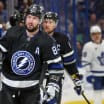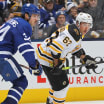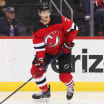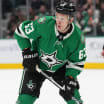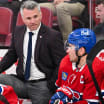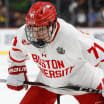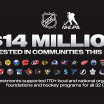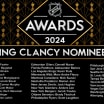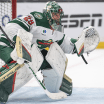NHL.com's Q&A feature called "Five Questions With …" runs every Tuesday. We talk to key figures in the game and ask them questions to gain insight into their lives, careers and the latest news.
The latest edition features MSG Network hockey analyst and former New Jersey Devils captain Bryce Salvador:
Five Questions with Bryce Salvador
Former Devils captain discusses defining moment of career, adapting to television
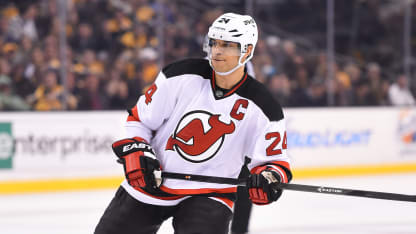
© Brian Babineau/Getty Images
Bryce Salvador remembers the defining moment of hockey career.
It came while the defenseman was a healthy scratch during his first month with Worcester, then the American Hockey League affiliate of the St. Louis Blues.
The Blues signed Salvador to a free agent contract in December 1996 after the Tampa Bay Lightning, who chose him in the sixth round (No. 138) of the 1994 NHL Draft, told him he would never play in the NHL.
"You have an expansion team telling you you're never going to play, to then signing and then going down to the minors and then don't even dress for the first month," Salvador said. "I'm sitting in the stands and thinking, 'What am I doing?' I decided to just put my head down and not allow other people tell me what I couldn't do."
Salvador not only played 13 NHL seasons, he overcame a scary injury to become the third black captain in NHL history, following Dirk Graham (Chicago Blackhawks) and Jarome Iginla (Calgary Flames). He wore the "C" for three seasons with the New Jersey Devils (2012-15).
"I went through a pretty unique evolution when hip-hop started becoming popular," Salvador said. "It's something I always joke about. In my first season with the Blues (2000-01), Jamal Mayers and I got one rap song in the locker room, so we'd play that one song all the time. You go into a locker room today and it's 90 percent hip-hop or rap."
Salvador was traded by the Blues to the Devils on Feb. 26, 2008. He was hit in the face by a slap shot in the 2009-10 season and was forced to sit out 2010-11 while recovering from a mysterious injury that threw off his balance, vision and spatial awareness, but was not a concussion. He returned the following season, helped the Devils advance to the 2012 Stanley Cup Final and was named captain in 2012-13.
He's currently a hockey analyst for MSG Network and is NHL alumni ambassador for
NextGenAaa.org
. Salvador has been married 20 years to his wife April and they have two sons. Pierson, 12, is an aspiring actor and Hudson, 9, plays for the New Jersey Rockets squirts AAA hockey program coached by dad.
Here are Five Questions with … Bryce Salvador:
How do you view being the third black captain in NHL history?
"To be captain of a National Hockey League team is such an honor and such a privilege especially with the Devils, knowing all the great captains they have had here ... it's humbling. It wasn't really until after the fact you start realizing, 'Wow, there's only been (two) other (black) captains.' A lot of times you don't look at it as black or white. I didn't know anything about (NHL diversity ambassador and Hockey Hall of Famer) Willie O'Ree until I really got to the minors, getting into the NHL and the system. In Canada, I looked at (Hockey Hall of Fame goalie) Grant Fuhr. He was really someone that looked like me, and I said, 'Hey, there's something there,' and that just resonated with me. Then the success that he had in winning the Stanley Cup and seeing him excelling."
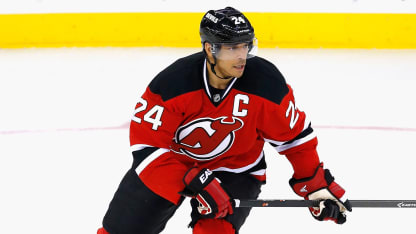
© Paul Bereswill/Getty Images
How did then-Devils general manager Lou Lamoriello reveal your captaincy?
"Lou and I had a really interesting relationship during my missed season (2010-11). I still came to the rink 3-to-4 times a week even when I wasn't playing and spent a lot of time with him watching practice and talking about things. He jokes about it now, saying he was grooming me (for the captaincy). But it's also tough when you're not that prototypical captain. I'm not going to go out there, score 90 points or necessarily be an offensive game-changer. I valued my importance by what I could do for the culture and lead by example. Lou probably didn't make a big deal of announcing me as captain because he knew my personality. I'm not a look-at-me type of guy. I like to be first at the rink when I play, have all my stuff laid out, and go about my business. I just wanted people to see how I conducted myself. To me, saying I was a captain and in moments like this where you can tie it into Black History Month and the significance of that, it all comes full circle for me."
Do you remember the first time you met Willie O'Ree?
"It was humbling. I didn't want to bother him. I just wanted to thank him and be respectful of his time. I met him about three years ago and while I was in New Jersey. The NHL does a fabulous job of helping him and giving him the credit he's due so now he's become more approachable. It's easier to see Willie at the rink now. I congratulated him on his Hall of Fame induction and thanked him for all he's done. As I became older, more mature and started understanding, I began to realize just what he did for black hockey players and what he went through. I'm greatly appreciative of what he did for the game. What's so great about the NHL is the inclusion of the message 'Hockey Is For Everyone.' It's so important because it doesn't necessarily mean players of color; it could be your background, your language, the culture you come from. When you start having that acceptance, you grow the game globally. Willie was so important in breaking down that barrier."
What are the most memorable moments of your NHL playing career?
"I remember my first NHL game, and my first defense partner on my first shift, Hockey Hall of Famer Al MacInnis. MacInnis was my stall partner for two years and I just sat there like a statue and never really said a word. I'll never forget being traded to the Devils; what an experience I had in New Jersey. I remember missing the season due to the injury and then coming back and going on that Stanley Cup run. It was a surreal experience to go through all that and have the season and success I did. Being named captain, of course, is up there. Thing is, you hope that throughout your career the highs outweigh the lows and you can kind of last the test of time in terms of how you play and what you can contribute. The next chapter for me is what can I do to give back to the game for Black History Month, the different grassroots initiatives, and in trying to ensure there's opportunities for the next Bryce Salvador to feel welcome and have a chance. Those things are really important to me because I feel I can be a positive role model."
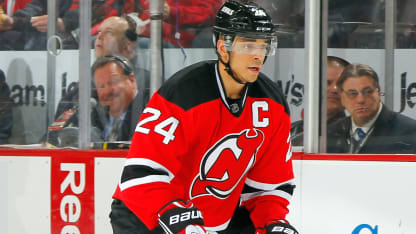
© Andy Marlin/Getty Images
What's most rewarding about being a television hockey analyst?
"The most fulfilling thing is I'm around the game again and doing the best I can to grow the game from a viewership standpoint. Everything I do in my endeavors is hockey-related, whether coaching the youth level, broadcasting, grassroots, or my company (
XHockeyProducts.com
). Broadcasting has been a fulfilling and fascinating challenge. I never realized how difficult it would be to call someone by their first name. To say Andy Greene for months was so foreign to me ... because it's always been Greener. I have to pause and remember, it's Andy Greene. The other part is disassociating your emotional side. There's a lot of crashing and banging when I'm between the benches and you want to just say, 'Are you kidding me right now?' I have to calm down because I start talking too fast. I enjoy breaking down the game, educating the fans the best I can, but I don't want to talk down to them. I want to make it as entertaining and as informative as possible. I had to train myself to not say things like 'PP', 'PK', 'Quick up', 'Blow the zone'. I like to pick a play and teach concepts of the game, like going low-to-high, and how it creates confusion and then use examples of how mistakes happen. I've enjoyed it very much."
